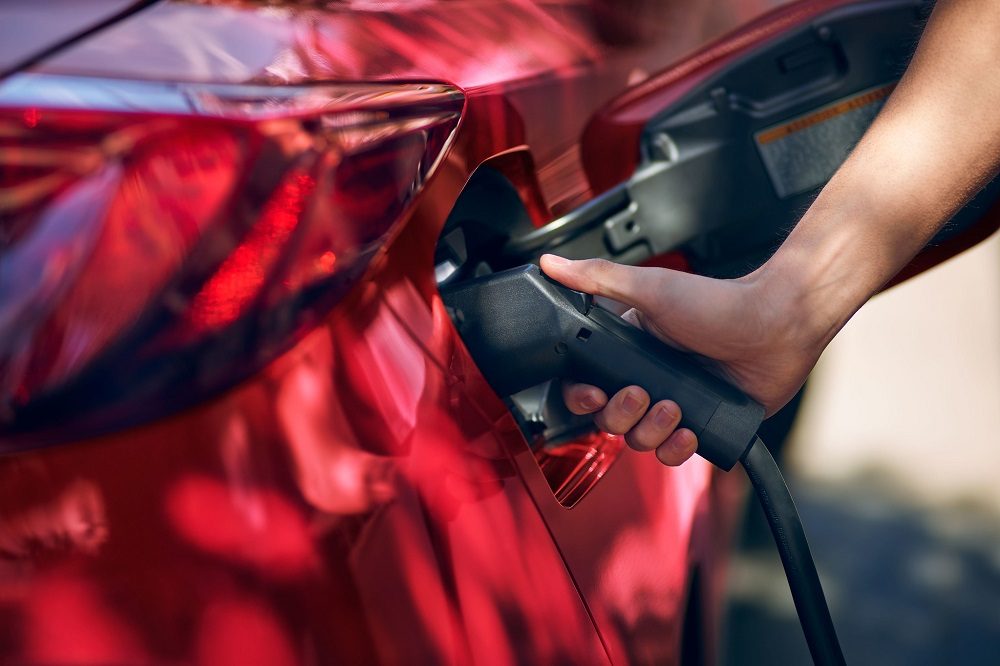 The Volkswagen e-Golf charging at the 2014 NAIAS
The Volkswagen e-Golf charging at the 2014 NAIAS
Photo: The News Wheel
Buying a used car has become a great way to save money on your next ride. The pre-owned market is full of quality-condition used vehicles priced well below their original full price — and shoppers have learned how to spot good deals vs. rip-offs.
But now that the automotive industry is moving from gasoline-powered combustion to electric and hybrid energy, used cars aren’t the same anymore. To help you navigate this changing market, here is some advice for buying a used hybrid or EV.
Shopping for a Used Car? Here are some more useful tips!
The core component that electric-powered models have that prior used cars didn’t are their rechargeable high-voltage battery packs. These batteries are usually designed to last at least a decade or 100,000 miles, but they can deteriorate preemptively from corrosion, lack of usage, prolonged freezing temperatures, or electrical problems that impeded regeneration.
You may encounter battery problems if you’re buying a used EV or hybrid. Have a professional mechanic diagnose the battery’s condition, because the cost of replacing a battery is very expensive. At that point, is even worth buying a used car to save money?
Hybrid and electric cars don’t put the same strain on the brakes to slow down that gas-powered cars do. This means that the brakes on EVs can last much longer than usual. However, that may lead some owners to neglect brake maintenance altogether, or for the brakes to rust from road salt and mud. Make sure the brakes look like they’re in good condition and functioning properly.
 Pictured: 2021 Hyundai Ioniq Electric
Pictured: 2021 Hyundai Ioniq Electric
Photo: Hyundai
Once of the main reasons to buy an electric-powered vehicle is better fuel economy — or no fuel consumption altogether. But, newer gas-powered sedans and crossovers boast such highly optimized performance that they rival early hybrid models. Make sure the hybrid you’re buying has been rated for fuel economy that’s well above gas-powered models in the same class.
Early hybrid and electric models were a bit buggy, so it’s wise not to buy the first production year of a brand-new model — and that goes for purchasing that same model as a pre-owned car. Give it 2-3 years at least into production for the manufacturer to have ironed out any kinks.
New electric cars offer benefits that used EVs and hybrids do not. One of the biggest is the potential tax incentive that rewards you for buying a new electric car. That bonus isn’t given to the second or third owner of a vehicle when it’s resold. You also may not have the same warranty coverages as a subsequent owner and will have to pay to transfer or extend the warranty.
 Pictured: 2020 Toyota Prius Prime
Pictured: 2020 Toyota Prius Prime
Photo: Toyota
Look at the vehicle history report and any retained service receipts for signs of problems, such as electrical issues. An accident — even a fender bender — can be very bad for an electric car since the impact can damage the integrity of the battery, its housing, or its connections. Also make sure the vehicle is up-to-date on software updates and any recalls.
If this is your first time buying a rechargeable electric car, you should make sure that you have the means to recharge your EV at home overnight or at your workplace during the day. Most hybrid cars don’t have this need, but plug-in models need a compatible outlet that you can reliably access every day.
Your usual mechanic may not be qualified to work on a hybrid or electric vehicle. Such models are built differently than traditional gas vehicles and require special service expertise. You’ll have to search—and possibly pay more — for a certified or specialized mechanic to perform pre-purchase inspection and perform ownership maintenance.
These are some of the considerations you should keep in mind when you’re shopping for a used EV like a Toyota Prius, Hyundai IONIQ, or Ford Focus.
Aaron is unashamed to be a native Clevelander and the proud driver of a Hyundai Veloster Turbo (which recently replaced his 1995 Saturn SC-2). He gleefully utilizes his background in theater, literature, and communication to dramatically recite his own articles to nearby youth. Mr. Widmar happily resides in Dayton, Ohio with his magnificent wife, Vicki, but is often on the road with her exploring new destinations. Aaron has high aspirations for his writing career but often gets distracted pondering the profound nature of the human condition and forgets what he was writing… See more articles by Aaron.



